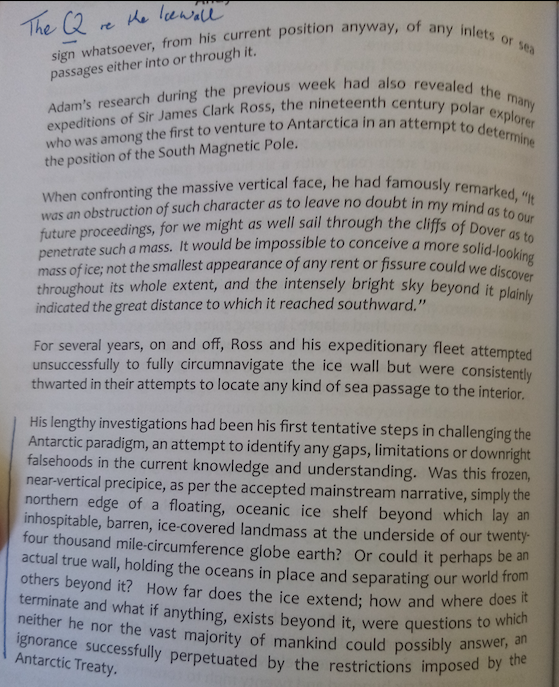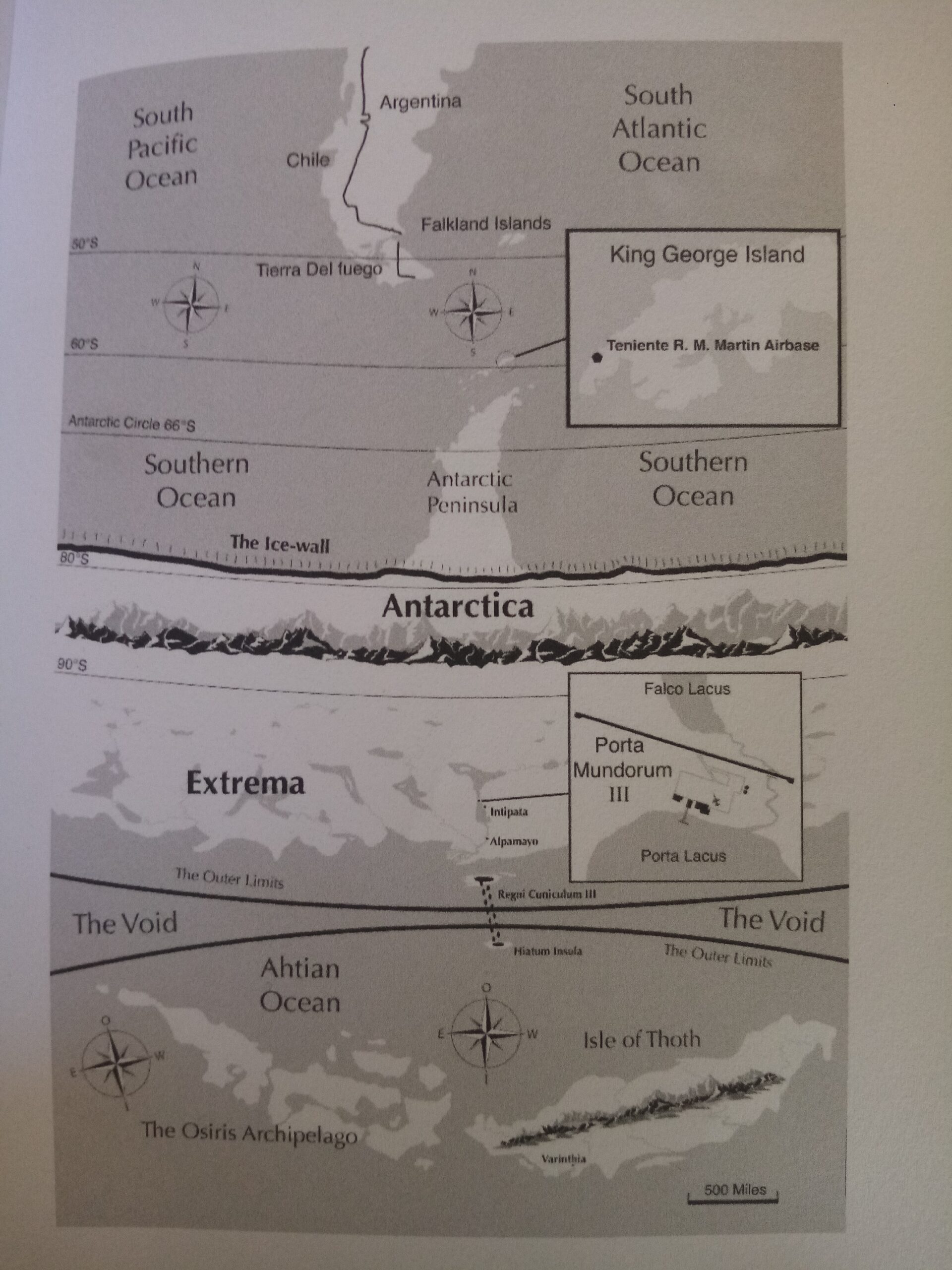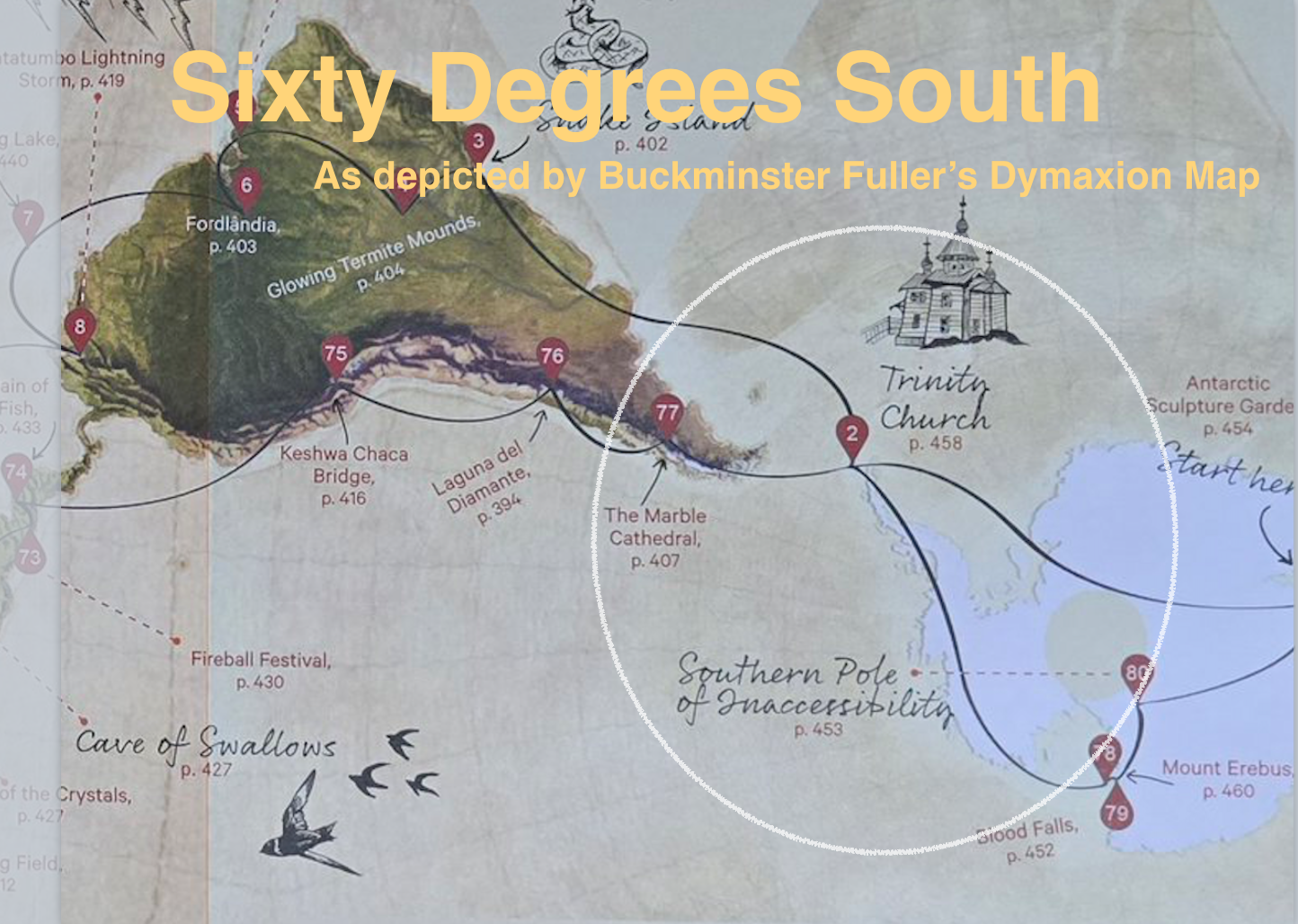A review of “Sixty Degrees South – Beyond the Ice Wall” by Andy Ross and John Hamer.
Note (15/09/25): the previous article had a long preamble to the review. This concentrates on the review only.
The premise of the novel is that due to the Antarctic Treaty of 1959, no civilian of any country is permitted to travel any further South beyond the 60th degree of latitude. When private individuals attempt it, they will be ordered to turn back. Should they disobey the order, then the vehicle – plane or boat – will come under fire.
In this story, two British air pilots, Adam and Dobbo, are deployed on a remote air base south of Chile, near the 60th degree to do just that.
When Adam’s military and social programming begins to break down, he goes rogue, with Dobbo, reluctantly at first, following suit.
There follows what is best described as a full-on Boys’ Own Adventure – the tale features all manner of gadgetry – from the vintage jet fighters the two men use, to weaponry and a ‘med-bed’ which will cure any and all ailments and injuries in a matter of minutes.
As with all such tales, there is a villain or two and it is their corrupt superior (Prendagast) who is the chief miscreant in this case.
Interwoven with the heroes’ narrative, there are revelatory passages, discourses and curious mysteries surrounding Antarctica, its dimensions, its status and previous explorations.
No true boy, young or old, will fail to be grabbed by the essential mystery of it all. After all, a man does not stop learning once he leaves the indoctrination centre of his youth. Exploration, I would posit, is his natural proclivity.
The authors are clearly ‘old boys’ who have maintained a healthy disregard for mainstream narratives and a love of exploration, problem solving, adventure and the Truth.
Thus, Sixty Degrees is a marvellous boys’ own adventure, a delightful blend of fact and fiction, woven with the threads of the discoveries of previous adventurers like Scott (of the Antarctic), sailors of yesteryear – like Captains James Cook and James Ross, whose journeys took them thousands of miles along the 2 mile high ice wall and which were, literally, endless and, inevitably, the discoveries of Admiral Byrd and the ensuing attempts to hide them from the public.
The Truth is Stranger Than Fiction is the aphorism which keeps gently chiming in my mind as I read the book. Whilst the central narrative of the two heroes is fictional, the interweaving of the facts regarding Antarctica as well as the mysteries of New Schwabenland, the evidence of the Third Reich’s establishment of a break-away civilisation there, the curious disappearance of Amelia Earhart and her navigator all combine to make it a compelling read.
There is also the fact that there are maps from the 1500s which show Antarctica to be free of snow and ice. Naturally, any man with a questioning mind and a curiosity about the realm he is in, will be drawn to seeking answers to these mysteries.
Therefore, it’s plain to state that given the secrecy and the nagging sense that we have been lied to about the nature of our realm, the desire for exploration will rise in many men who would love to explore the region, map its area and investigate exactly who or what is to be found there. In that sense, Sixty Degrees may prove to be somewhat visionary as more and more men seek to explore the region beyond the Ice Wall.
Ross and Hamer’s conjecture is that there are vast lands beyond the Ice Wall, resources and civilisations which are demonstrably kept secret from the public.
Why has the actual nature of this realm been so successfully hidden from us?
The answer, I would posit, is that the mind-benders, who are in service to the forces of the demiurge, want to ensnare everyone in a web of lies. If a man does not know where he is, then he is, quite literally, lost.
Lost in a Godless universe, where, according to uniformitarian narratives, he is but an accident of evolution, somehow washed up on a ball-shaped rock that is hurtling through space. Lost in a meaningless virtual prison for his mind and his soul.
Uniformitarian belief would have us trapped in a false perception of chronology and falsified history (incidentally John Hamer has written and published a book, entitled, The Falsification of History) – in which everything is evolving – subject to vast stretches of time, a world in which he there is no Divine Creation, only accidents, with no recorded history of those cataclysms which are periodic in their repetition and whose occurrences were marked and set in stone for future generations to know about and prepare for accordingly.
A young man, filled with boundless curiosity to find out exactly where he is, will naturally seek the answers to who and what he is, how he fits into the chronology of the world and what are the dimensions of the reality in which he finds himself.
That is the natural spirit of man and hence there is immeasurable power to be gleaned from the Boys’ Own stories that come into his purview.
It thus follows that to describe Sixty Degrees South as a classic of the Boys’ Own genre is to praise the spirit in which it was written and the subject matter, which is vast in its scope. It’s also worth stating that the two authors manifestly enjoyed writing it and that, inevitably, adds to the reader’s own enjoyment of the novel.
Adam and Dobbo are the two heroes and their story is an exciting one involving jet-fighter technology, hidden and classified information, a treacherous system of command, populated by dodgy characters, dog-fights, travel to uncharted lands, healing technologies and civilisations without deceptive hierarchies that are built on the Golden Rule,
“Do Unto Others As You Would Have Them Do Unto You.”
The interwoven historical narratives – the mysteries of Captains Cook and Ross who attempted to find a way through the Ice Wall (below), of Scott of the Antarctic, the sinking of the Titanic (and its associations with the 1913 foundation of the financial fraud that is the Federal Reserve), the explorations and revelations of Admiral Byrd, Amelia Earhart’s strange disappearance, James Forestall’s association with Byrd and his dubious death and the activities of the Third Reich in Antarctica – jointly and severally add to the quality of the book.

It’s interesting to note also that there are many strange anomalies concerning what is known as the North Pole – similarly has a forbidden flight zone and is another extreme region explored by Admiral Byrd. The Smoky God is a novel that is also based on the supposedly factual exploration of a youth and his father who sailed far North to discover advanced beings living in a hollow earth, whose entry point is accessible from beyond the North Pole and which are detailed in The Smoky God. Asgard, Agartha and Shambala are names given to these realms that exist deep underground and which were well-known to the ancients.
Whilst the Truth is invariably stranger than fiction, it’s also the case that fiction can be used to convey the Truth and that the suspension of disbelief allows for its transmission into the imagination of the reader.

Sixty Degrees South exemplifies the point perfectly: it is a fictional adventure story rooted in the facts and mysteries surrounding the ‘forbidden zone’ and, in that sense, what Andy Ross and John Hamer have written is a rip-roaring yarn, a tale of incredible discovery – which includes a requisite map (see above) – and the sort of heroic challenges that any boy, young or old, will love. Why? On the simple basis that it will fire his imagination and determination to make sense of the realm he finds himself in (though not of).
At some point, he may well come to the realisation that he is a holy sojourner, passing through a divine construct that is a university for his soul, filled with trials, tribulations and triumphs that constantly test him. Which, whether we like it or not, is simply how it is:
“Our struggle is not against flesh and blood, but against the rulers, against the authorities, against the powers of this dark world.”
Ephesians 6:12
All of which, ultimately, is his raison d’être – the very point of his life and all his natural proclivities to find out who/what he is and where he exists in the great scheme of things.
As John Keats wrote,
“The Truth is Beauty; Beauty is Truth
That is All on Earth Ye need to Know.”
Thus, I have no hesitation in recommending Sixty Degrees South as a great read for any man (young or old) who is still in touch with his natural state of curiosity and it can be ordered from the dedicated website or on Amazon.
________________________________________________
As ever, thank you for your attention. Should you value these essays and my discourses on RogueMale, then please tip me a few quid via the Buy Me a Coffee button and/or take out a subscription to my Substack pages.
_______________________________________________
Further reading: “The earth is stationary. A rotating Earth would have to be moving fastest at the equator and slowest near the north and south poles. But there is no difference in speed at any point on the Earth’s surface, whether north of, south of, or at the equator. Therefore, the earth is stationary – not rotating about its polar axis.”
“1) If the Earth rotated about its polar axis, it would have to be moving fastest at the equator and slower at each mile closer to the north and south poles. Theoretically, the tiny point at each pole would not be moving at all. (We will explain this proof below, after listing a few additional points.)” […]
“4) If the Earth was rotating as we are told (i.e., from west to east in direction), an airplane would have to travel much faster to fly from Los Angeles to Miami than from Miami to Los Angeles. And the required speed to fly west-to-east at cities close to the equator would be much greater than speed needed to go from, say, Toronto to Moscow (since the Earth’s speed of rotation closer to the North Pole would be less than farther to the south).” Source

